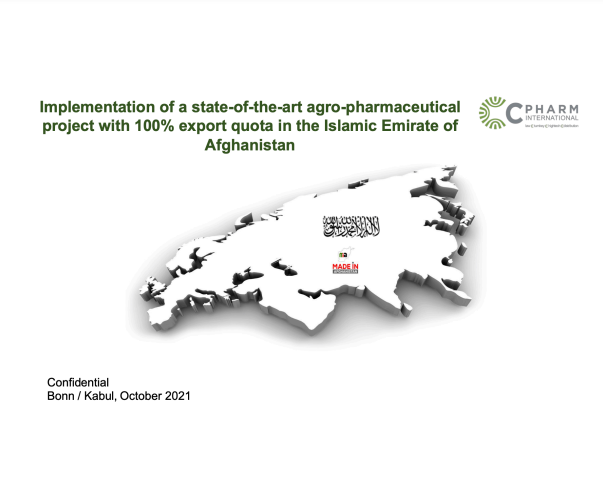Last Week In Weed Issue 50
Published January 3rd 2022
In the first issue of Last Week in Weed of 2022. We’ll be looking at that Germany Taliban cannabis deal, A Brazilian study that shows cannabis consumers report having a higher quality of life, and Cancard is being put to the test in a court on the Isle of Wight.
Cpharm Taliban deal contingent on regime gaining international recognition.
As we reported in issue 47 last November, a German cannabis company called Cpharm was revealed to be in discussions with the newly installed Afghani Taliban regime. These negotiations were a continuation of previous attempts with the now-ousted government to secure a deal to build infrastructure to cultivate ‘pharmaceutical cannabis’ exclusively for exportation.
At first, the legacy media incorrectly associated a small family-run pharmaceutical medical advice company in Australia with the deal. Further confusion was created when it was reported that the deal would be worth $450million and not the $45million Cpharm was discussing. However, the confusion was quickly cleared up when the German-based ‘cannabinoid-based medicine’ company publicly confirmed that it is indeed in open negotiations with the Taliban.
Although initially caught off guard, the company recently issued the following statement;
“CPharm is waiting for inter-governmental negotiations between the current Afghan Government and the importing countries. Also, in order to proceed with investments in medical cannabis facility, it is essential for the current government to receive approval from the United Nations’s International Narcotics Control Board (INCB)” – Cpharm spokesperson
The company’s CEO has claimed that the company has been in Afghanistan since 2017. Yet it had failed to establish meaningful commitments from the US-backed government not because of religious objections or regime repression, but due to US corruption.
“We started talks with Afghanistan in 2017 when their parliament passed a medical cannabis law, In November 2020, we started to establish infrastructure near Mazar-i-Sharif in the north of the country, bringing in experts to build a laboratory. But the former government put in place by the Americans was very corrupt.” – Cpharm CEO Werner Zimmerman
Since the fall of the US-backed regime in August 2021, Cpharm CEO Werner Zimmerman believes that the company now has a better chance of securing the deal it wants under Taliban rule. “The new government loves us very much because we are their voice to show the world how the old government betrayed everyone.”
This deal would establish a similar system to the arguably rather exploitative one currently undertaken by Cpharm in Morocco. The north African nation that ‘legalised’ the cultivation of ‘industrial and medical’ cannabis for exportation in May 2021. Cpharm will build the infrastructure, supply the genetics, and provide the equipment for local farmers to cultivate cannabis to the company’s standards for exportation from Afghanistan to Europe and beyond.
Afghanistan has a long and rich history of cannabis and hashish production
“Due to the geographical location of Afghanistan, 4 times larger medical cannabis harvest can be brought in per [meters squared] than, for example, in Morocco, the largest cannabis growing area in the world.” – Cpharm report
If the Taliban could find international recognition the deal would be legally permitted under the country’s current laws. As the previous Afghan government quietly ‘legalised’ the production, processing, transport, and export of ‘pharmaceutical cannabis’ back in 2017. However, it is again claimed by the Cpharm CEO that widespread corruption prevented the establishment of a meaningful domestic cannabis industry producing exclusively for exportation.
“The previous government was in bed with criminals who wanted to keep a monopoly on illicit cultivation and blocked our contract. Why has the law existed since 2017 and they never proceeded? America has been propping up a corrupt government.” – Cpharm CEO Werner Zimmerman
Cpharm has recently received some criticism and backlash for pursuing a deal with the oppressive religious regime after the US-backed government fell last year. It has responded by releasing its 21 page ‘confidential’ presentation. In which the company’s outlines its goals as; “to build an ecological, sustainable value chain in agriculture and pharmaceutical industry in the Islamic Emirate of Afghanistan to provide a highly profitable alternative to the current No. 1 and 2 of the Afghan economy, mining and illegal poppy and cannabis industries for the international drug market.”
Historically the Taliban have been rather anti-drugs within the territories it controls. However, during its decade-long insurgency of Afghanistan, the group is widely suspected to have financially benefited from the illicit production and trade of heroin and hashish both in and out of the country. Using the sale of illicit drugs to fund warfare is a tactic the Taliban adopted from their predecessors in the region, the CIA-backed Mujahideen.
So what is going on here? Well, on the surface Cpharm is pitching its $45million dollar Afghanistan investment as a social good and a way to help rebuild the country. However, its business model reveals that Cpharm, foreign investors, and the Taliban would benefit most from this deal, not ordinary Afghani citizens.
The other issue here is the ethics of allowing European investors to profit from the domestic cultivation and exportation of cannabis in a middle eastern country knowing its sale will directly fund and solidify the Taliban’s power base in Afghanistan. This is rather well articulated by Transform Drug Policy Foundation UK senior policy analyst Steve Rolles when speaking to MarijuanaMoment.net.
“In many respects we can see the same exploitative colonial structures that have played out through the drug war being replicated. There is also the obvious concern that an injection of capital will enrich and empower the highly problematic Taliban regime—which is the reason why traditional aid donors have been very reluctant to return to Afghanistan since the allied withdrawal, despite the obvious needs of Afghani people.” – Steve Rolles
With the regime once again taking over the middle-eastern nation there has been an increase in the repression of women and an increase in alcohol and drug raids in the region. There have also been reports of ‘addicts’ being rounded up and placed in forced sobriety rehabilitation programs against their will.
The situation is confusing and grows ever more complex now that the new German ‘Traffic light government’ is set to ‘legalise the sale of cannabis in Germany.’ This could mean that Cpharm faces some competition in the middle east as other businesses seek to exploit Afghanistan’s geography, cheap labour, cannabis cultivation expertise, and its extensive history of hashish production.
Germany’s decision to ‘legalise the sale of cannabis to adults’ may detrimentally impact their domestic ‘pharmaceutical cannabis’ industry, which is currently Europe’s largest ‘medical’ market. After all, countries that allow both an adult consumption market and a prescribed/therapeutic one seem to be dominated by the former.
Cpharm Afghanistan Report (click to view)
Cannabis consumers report a higher quality of life in a new study.
A new cross-sectional study from Brazil reveals that regular or habitual cannabis consumers self-reported having a higher quality of life than those who didn’t consume cannabis. In the paper published in the Journal of Psychiatric Research. The team of researchers used an online survey to select 7405 individuals for their research.
The subjects were selected from the survey respondents. Their data obtained during the questionnaire was then correlated to produce standardised measures to assess their subjective well-being and quality of life. Subjects’ mental health was assessed using depression and anxiety scoring systems and their cannabis and other substance use history and prevalence were documented.
This resulted in 6620 respondents being identified as cannabis consumers and the remaining 785 as non-consumers. Among the cannabis group, 17.1% identified themselves as occasional consumers, 64.4% as habitual consumers, and 7.7% as dysfunctional consumers. The majority of the subjects were employed, childless, high-school educated young men.
“The highest scores for quality of life were observed among habitual cannabis users, followed by occasional users, while both non-users and dysfunctional users presented less favorable scores. Subjective measures of well-being were higher among habitual and occasional users than among non-users, whereas dysfunctional users were the most affected. Poor quality of life, depression or anxiety were more prevalent among dysfunctional users, but non-users of cannabis reported more depression or anxiety symptoms and less quality of life than both occasional and habitual users”
“The results obtained in this study are particularly relevant because they refer to a sample predominantly composed of habitual cannabis users from the general population, a rarely represented group in other surveys. The fact that cannabis use is generally associated with increased risk of adverse health outcomes was not observed in this study” – Brazilian study
Given that it is rather difficult to contextualise and quantify the meaning of well-being or quality of life. Then the results from this study at best suggest that individuals that have a healthy relationship with cannabis at least perceive themselves to have a better quality of life than those that do not. I know cannabis improves the quality of my life and that’s while ill keep consuming and defending it.
Cancard is being put to the test on the Isle of Wight.
The final story that we’ll be looking at this week involves the controversial Cancard being tested for the first time in a UK court. A Cancard patron on the Isle of Wight is set to be the first to challenge an attempted conviction for cannabis possession on the grounds the card grants him medical dispensation to possess and consume cannabis therapeutically.
The forty-year-old man did not enter a plea when he appeared at the Isle of Wight Magistrates’ Court on December 21st for the alleged offence which took place a few months early in September. When the man presented the card to the CPS prosecutor, Ann Smout stated that she ‘had never seen such a card in any case before.’ This resulted in the CPS asking for an adjournment so that a senior Crown Prosecution Service lawyer could ensure the card is authentic and can form a part of a valid defense in law.
This isn’t the defendant’s first cannabis possession offense having previously appeared in court for possession in 2020. A guilty plea was entered on that occasion but the man’s counsel stated that he consumed cannabis to help him manage his anxiety, but accepted that it still remains illegal. The man was ordered to pay a £40 fine, a £34 surcharge, and £40 court costs.
“We are supporting the patient and his family and will do our best to ensure a positive result for him. Drug laws on the Isles are usually pretty harshly policed, certainly more so than the mainland, but a positive result here could set a brilliant precedent. We don’t have permission to disclose much about the case as of yet, and we certainly need to be mindful that this is a particularly vulnerable patient, but we will update you as and when we can.” – Carly Barton, Cancard founder.
I’m not a betting man but I’d say there are pretty good odds that this case will be dismissed by the judge. Unlike the Crown Dependency Islands that have some autonomy, the Isle of Wight off the south coast of England is under complete jurisdiction from Westminster. This means that any ruling made here would be applicable to other UK Magistrates courts on the mainland too.
The court will reconvene on January 11th to complete the proceedings. So hopefully by next week, we’ll have an idea of what the judiciary thinks of the concept of Cancard and its validity as a defense in court.
As for Cancard, a positive outcome, in this case, would by extension validate the premise of the card and effectively grant it a big stamp of approval from the UK judicial system. This would further boost its already impressively high member numbers. Which as of May 2021 stand at over 25,000 registered service users.
So let’s wait and see what happens. Have a great week folks!
Written By Simpa For The Simpa Life





